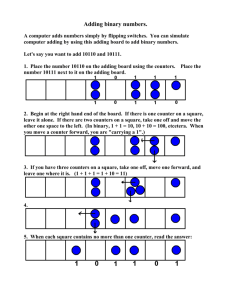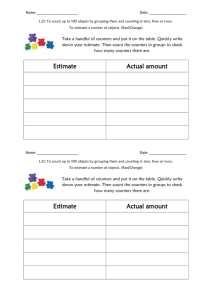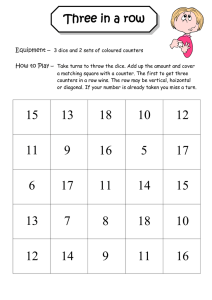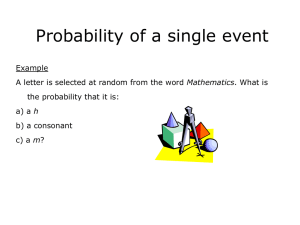Madbag Task
advertisement
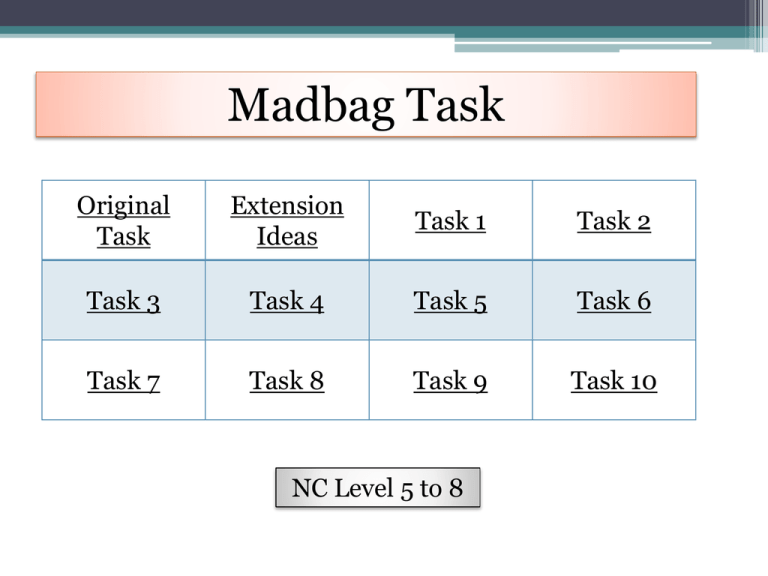
Madbag Task Original Task Extension Ideas Task 1 Task 2 Task 3 Task 4 Task 5 Task 6 Task 7 Task 8 Task 9 Task 10 NC Level 5 to 8 Madbag Original A bag contains only red counters and blue counters. There are 90 red counters in the bag. The probability of choosing a red counter from the bag is 0.3 How many blue counters are in the bag? Home Madbag Easier Give the total number of counters and ask how many reds Use simple fractions Reduce the number of counters Variation Change the number of counters Change the decimal Change the probability to a percentage Give the probability as a ratio In words: Twice a likely to get pick a blue or red:blue = 2:1 Add an extra colour and give the probabilities of two of them Give the numbers of counters and ask them to find the probability Extension What is the probability of selecting two blues with/without replacement Home Madbag 1 A bag contains only red counters and blue counters. There are 120 counters in the bag. The probability of choosing a red counter from the bag is 0.3 How many red counters are in the bag? Home Change the number of counters Change the probability Use fractions or percentages Madbag 2 A bag contains only red counters and blue counters. There are 150 counters in the bag. The probability of choosing a red counter from the bag is 0.3 How many blue counters are in the bag? Home Change the number of counters Change the probability Use fractions or percentages Madbag 3 A bag contains only red counters and blue counters. There are 90 red counters in the bag. The probability of choosing a red counter from the bag is 0.3 How many blue counters are in the bag? Home Change the number of counters Change the probability Use fractions or percentages Madbag 4 A bag contains only red, blue and green counters. There are 120 counters in the bag. The probability of choosing a red counter is ¼ and the probability of choosing a blue counter is 0.2 How many green counters are in the bag? Home Change the number of counters Change the number of colours Change the probabilities Madbag 5 A bag contains only red, blue and green counters. There are 80 blue counters in the bag. The probability of choosing a red counter is ¼ and the probability of choosing a blue counter is 0.2 How many green counters are in the bag? Home Change the number of counters Change the number of colours Change the probabilities Madbag 6 A bag contains only red, blue and green counters. There are 60 blue counters in the bag. The probability of choosing a red counter is ¼ and the probability of choosing a green counter is 1/3 How many red counters are in the bag? Home Change the number of counters Change the number of colours Change the probabilities Madbag 7 A bag contains only red and green counters. There are 80 counters in the bag. The probability of choosing a red counter is 0.4 If you select a counter and replace it and then select a second counter, what is the probability that you have two red counters? Home Change the number of counters Change the number of colours Change the probabilities Madbag 8 A bag contains only red and green counters. There are 60 counters in the bag. The number of red counters is 15 If you select a counter and replace it and then select a second counter, what is the probability that you have two green counters? Home Change the number of counters Change the number of colours Change the probabilities Madbag 9 A bag contains only red and green counters. There are 80 counters in the bag. The probability of choosing a red counter is 0.4 If you select a counter and don’t replace it and then select a second counter, what is the probability that you have two red counters? Home Change the number of counters Change the number of colours Change the probabilities Madbag 10 A bag contains only red and green counters. There are 60 counters in the bag. The ratio of red to green counters = 2:3 If you select a counter and don’t replace it and then select a second counter, what is the probability that you have two green counters? Home Change the number of counters Change the number of colours Change the probabilities
